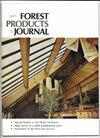全球价值链参与对林产品出口碳含量的影响:金融危机冲击下的准自然实验
IF 1.2
4区 农林科学
Q3 FORESTRY
引用次数: 0
摘要
合理评估林产品融入全球价值链的环境效益对促进可持续发展具有重要意义。本文以2002 - 2014年41个国家的林产品行业数据为基础,利用2008年金融危机这一全球价值链负面冲击的准自然实验,探讨了全球价值链参与对出口隐含碳的影响。我们发现,深化对林产品价值链的后向参与比向前参与导致的碳排放增幅更大。金融危机后,全球价值链参与大幅减少的国家(相对于减少较少的国家)通过林产品出口规模的更大减少,以及资本投资的相对减少导致资本密集型产品增长率的下降,减少了林产品出口所含的更多碳。他们通过降低技术人员的增长率来增加出口的隐含碳。在林业技术人员的指导下,加强全球价值链的技术效应是减少出口隐含碳的关键途径。本文章由计算机程序翻译,如有差异,请以英文原文为准。
The Effect of Global Value Chain Participation on Carbon Embodied in Forest Product Exports: A Quasi-Natural Experiment from the Financial Crisis Shock
Abstract Reasonable assessment of the environmental benefits of integrating forest products into global value chains (GVCs) is important to promote sustainable development. Based on the forest product sector data for 41 countries from 2002 to 2014, this paper explores the impact of GVC participation on carbon embodied in exports using the 2008 financial crisis, a quasi-natural experiment of negative global value chain shocks. We found that deepening backward participation in forest product value chains led to more substantial increases in carbon emissions than did forward participation. Countries with large decreases in GVC participation reduced more carbon embodied in forest product exports after the financial crisis (relative to countries with small decreases) through a larger reduction in the scale of forest product exports, and a decrease in the growth rate of capital-intensive products as a result of the relative decline in capital investment. They increased the embodied carbon of exports through a decrease in the growth rate of skilled personnel. Strengthening the technology effect of GVCs with the guidance of skilled forestry personnel is a key way to decrease exported embodied carbon.
求助全文
通过发布文献求助,成功后即可免费获取论文全文。
去求助
来源期刊

Forest Products Journal
工程技术-材料科学:纸与木材
CiteScore
2.10
自引率
11.10%
发文量
30
审稿时长
6-12 weeks
期刊介绍:
Forest Products Journal (FPJ) is the source of information for industry leaders, researchers, teachers, students, and everyone interested in today''s forest products industry.
The Forest Products Journal is well respected for publishing high-quality peer-reviewed technical research findings at the applied or practical level that reflect the current state of wood science and technology. Articles suitable as Technical Notes are brief notes (generally 1,200 words or less) that describe new or improved equipment or techniques; report on findings produced as by-products of major studies; or outline progress to date on long-term projects.
 求助内容:
求助内容: 应助结果提醒方式:
应助结果提醒方式:


